gestation (to the entity or Ego), still more slowly but far more imperfectly & incompletely to the shell, and fully to the Ego at the moment of its entrance into the Devachan. And now the latter being a state determined and brought by its past life, the Ego does not fall headlong but sinks into it gradually and by easy stages. With the first dawn of that state appears that life (or rather is once more lived over by the Ego) from its first day of consciousness to its last. From the most important down to the most trifling event, all are marshalled before the spiritual eye of the Ego; only, unlike the events of real life, those of them remain only that are chosen by the new liver (pardon the word) clinging to certain scenes and actors, these remain permanently — while all the others fade away to disappear for ever, or to return to their creator — the shell. Now try to understand this highly important, because so highly just and retributive law, in its effects. Out of the resurrected Past nothing remains but what the Ego has felt spiritually — that was evolved by and through, and lived over by his spiritual faculties — they be love or hatred. All that I am now trying to describe is in truth
Письмо №85-Б
Письмо №85-Б (ML-24b)
Махатма К.Х. - А.П. Синнетт
середина Сентября, 1882
Страниц - 30.
Страница 22
— indescribable. As no two men, not even two photographs of the same person, nor yet two leaves resemble line for line each other, so no two states in Deva-Chan are like. Unless he be an adept, who can realize such a state in his periodical Deva-chan — how can one be expected to form a correct picture of the same?
Therefore, there is no contradiction in saying, that the ego once reborn in the Devachan, "retains for a certain time proportionate to its earth life a complete recollection of his (Spiritual) life on earth." Here again the omission of the word "Spiritual" alone, produced a misunderstanding!
All those that do not slip down into the 8th sphere — go to the Devachan. Where's the point made or the contradiction?
The Devachan State, I repeat, can be as little described or explained, by giving a however minute & graphic description of the state of one ego taken at random, as all the human lives collectively could be described by the "Life of Napoleon" or that of any other man. There are millions of
Страница 23
various states of happiness & misery, emotional states having their source in the physical as well as the spiritual faculties and senses, and only the latter surviving. An honest labourer will feel differently from an honest millionaire. Miss Nightingale's state will differ considerably from that of a young bride who dies before the consummation of what she regards as happiness. The two former love their families; the philanthropist — humanity; the girl centres the whole world in her future husband; the melomanic knows of no higher state of bliss & happiness than music — the most divine and spiritual of arts. The devachan merges from its highest into its lowest degree — by insensible gradations; while from the last step of devachan, the Ego will often find itself in Avitcha's faintest state, which, towards the end of the "spiritual selection" of events may become a bona fide "Avitcha." X Remember, every feeling is relative. There is neither good nor evil, happiness nor misery per se. The transcendent, evanescent bliss of an adulterer, who by his act murders the happiness of a husband, is no less spiritually
Страница 24
born for its criminal nature. If a remorse of conscience (the latter proceeding always from the 6th principle) has only once been felt during the period of bliss and really spiritual love, born in the 6th & 5th, however polluted by the desires of the 4th, or Kamarupa, — then this remorse mustsurvive and will accompany incessantly the scenes of pure love. I need not enter into details, since a physiological expert, as I take you to be, need hardly have his imagination and intuitions prompted by a psychological observer of my sort. Search in the depths of your conscience and memory, and try to see what are the scenes that are likely to take their firm hold upon you; when once more in their presence you find yourself living them over again; and that, ensnared, you will have forgotten all the rest — this letter among other things, since in the course of events it will come far later on in the panorama of your resurrected life. I have no right to look into your past life.
Whenever I may have caught glimpses of it, I have invariably turned my eyes away, for I have to deal with the
Страница 25
present A. P. Sinnett — (also and by far more "a new invention" than the ex A.P.S.) — not with the ancient man.
Yes; Love and Hatred are the only immortal feelings; but the gradations of tones along the 7 by 7 scales of the whole key-board of life, are numberless. And, since it is those two feelings — (or, to be correct, shall I risk being misunderstood again and say those two poles of man's "Soul" which is a unity?) — that mould the future state of man, whether for devachan or Avitcha then the variety of such states must also be inexhaustible. And this brings us to your complaint or charge, number —
— for, having eliminated from your past life the Ratigans and Reeds who with you have never transcended beyond the boundaries of the lower portion of your 5th principle with its vehicle — the Kama — what is it but the "partial remembrance" of a life? The lines marked with your reddestpencil are also disposed of. For how can you dispute the fact that music and harmony are
Clive Ratigan purchased The Pioneer in 1882, and the following year Sinnett left the paper where he had been employed for 11 years.
Страница 26
for a Wagner, a Paganini, the King of Bavaria & so many other true artists and melomans, an object of the profoundest spiritual love & veneration? With your permission I will not change one word in clause 9.
Pity you have not followed your quotations with personal commentaries. I fail to comprehend in what respect you object to the word "dream"? Of course both bliss and misery are but a dream; and as they are purely spiritual they are "intensified."
Answered.
Had I but written, — when answering Mr. Hume's objections, who after statistical calculations made with the evident intention of crushing our teaching, maintained that after all spiritualists were right and the majority of seance rooms spooks were "Spirits" — "In no case then, with the exception of suicides and shells" — and those accidents who die full of some engrossing earthly passion — is there any possibility for any other, etc., etc." I would have been perfectly right and pucka as a "professor"? To think that, eager
Страница 27
as you are to accept doctrines that contradict in some most important points physical science from first to last — you should have consented at Mr. Hume's suggestion to split hairs over a simple omission! My dear friend, permit me to remark that simple common sense ought to have whispered you that one who says one day: "in no case then etc.:" and a few days later denies having ever pronounced the word never — is not only no adept but must be either suffering from softening of the brain or some other "accident." "On margin I said rarely but I have not pronounced the word never" — refers to the margin of the proof of your letter N. II; that margin — or rather to avoid a fresh accusation — the piece of paper I had written upon some remarks referring to the subject and glued to the margin of your proof — you have cut out as well as the four lines of poetry. Why you have done so is known better to yourself. But the word never refers to that margin.
To one sin though I do, plead "guilty." That sin, was a very acute feeling of irritation against Mr. Hume upon receiving his triumphant statistical letter; the answer to which you found incorporated in yours when I wrote for you the materials for your answer to Mr.
Страница 28
Khandallawala's letter that you had sent back to H.P.B. Had I not been irritated I would not have become guilty of the omission, perhaps. This now is my Karma. I had no business to feel irritated, or lose my temper; but that letter of his was I believe the seventh or the eighth of that kind received by me during that fortnight. And I must say, that our friend has the most knavish way of using his intellect in raising the most unexpected sophisms to tickle people's nerves with, that I have ever known! Under the pretext of strict logical reasoning, he will perform feigned thrusts at his antagonist — whenever unable to find a vulnerable spot, and then, caught and exposed, he will answer in the most innocent way: "Why, it is for your own good, and you ought to feel grateful! If I were an adept I would always know what my correspondent really meant," etc. etc. Being an "adept" in some small matters I do know what he really means; and that his meaning amounts to this: were we to divulge to him the whole of our philosophy leaving no inconsistency unexplained, it would still do no good, whatever.
Страница 29
For, as in the observation embodied in the Hudibrasian couplet:
"These fleas have other fleas to bite 'em,
And these — their fleas ad infinitum . . . ."
— so with his objections and arguments. Explain him one, and he will find a flaw in the explanation; satisfy him by showing that the latter was after all correct, and he will fly at the opponent for speaking too slow or too rapidly. It is an IMPOSSIBLE task — and I give it up. Let it last until the whole breaks under its own weight. He says "I can kiss no Pope's toe," forgetting that no one has ever asked him to do so; "I can love, but I cannot worship" he tells me. Gush — he can love no one, and nobody but A. O. Hume, and never has. And that really, one could almost exclaim "Oh Hume, — gush is thy name!" — is shown in the following that I transcribe from one of his letters: "If for no other reason, I should love M. for his entire devotion to you — & you I have always loved (!). Even when most cross with you — as one always is most sensitive with those
Hudibrasian is a verse form of iambic tetrameter in closed couplets. The word is derived from the satiric work Hudibras, a mock-heroic 17th-century narrative poem by Samuel Butler.
These fleas was a quotation from Jonathan Swift, or a similar line by Augustus de Morgan.
Страница 30
one cares most about — even when I was fully persuaded you were a myth, for Even then my heart yearned to you as it often does to an avowedly fictitious character." A sentimental Becky Sharp writing to an imaginary lover, could hardly express her feelings better!
I will see to your scientific questions next week. I am not at home at present, but quite near to Darjeeling, in the Lamasery, the object of poor H.P.B.'s longings. I thought of leaving by the end of September but find it rather difficult on account of Nobin's boy. Most probably, also I will have to interview in my own skin the Old Lady if M. brings her here. And — he has to bring her — or lose her for ever — at least, as far as the physical triad is concerned. And now good-bye, I ask you again — do not frighten my little man; he may prove useful to you some day — only do not forget — he is but an appearance.
Yours,
K. H.
Becky Sharp is the anti-heroine of W. M. Thackeray's satirical novel Vanity Fair (1847–48).
my little man refers to Babaji, who would "lend" his body to Gwala K. Deb (whose mystical name was Dharbagiri Nath), a chela of Master K.H.

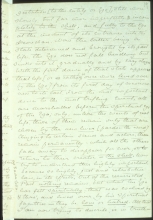
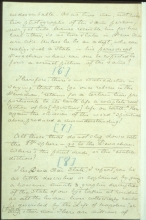
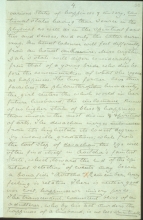
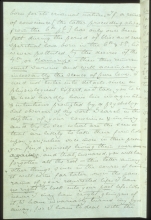
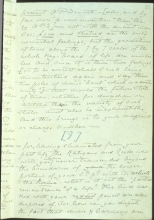
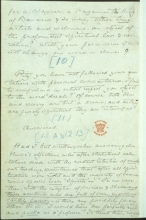
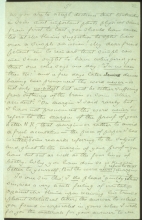
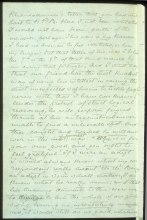
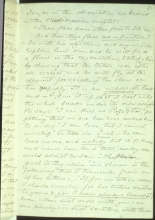
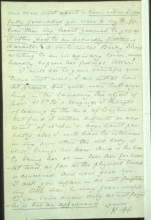

Miss Nightingale refers to Florence Nightingale, an English nurse noted for her work during the Crimean War and for founding nursing schools.
Avitcha is a miswriting by the chela-amanuensis for Avitchi.